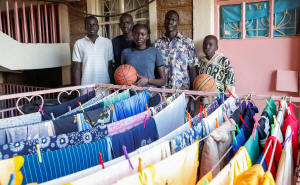New US refugee program lets Americans choose who to sponsor
 Send a link to a friend
Send a link to a friend
 [December 19, 2023]
By Ted Hesson and Mica Rosenberg [December 19, 2023]
By Ted Hesson and Mica Rosenberg
WASHINGTON (Reuters) - A new Biden administration refugee program to be
launched on Tuesday will let U.S. sponsors nominate specific people they
want to bring to the United States in an effort that could help families
reunite and involve more everyday Americans in resettlement efforts.
The program, under an initiative known as the Welcome Corps, will allow
groups of five or more U.S. citizens or permanent residents to nominate
a person or family to sponsor if they meet certain criteria and pass
background checks, officials told Reuters. Relatives of refugees,
religious groups, LGBT organizations and veterans are among those
expected to participate.
Previously, most refugees entering the U.S. have been selected by the
United Nations and U.S. State Department.
U.S. President Joe Biden, a Democrat seeking reelection in 2024, has
launched a range of programs to allow migrants and people fleeing their
home countries to enter the U.S. lawfully. The Biden administration aims
to bring in 10,000 refugees through sponsorships as part of an overall
goal of 125,000 refugee admissions in fiscal year 2024.
Under U.S. law, refugee status is reserved for people who apply from
abroad while migrants already in the U.S. can apply for a separate
status called asylum.
Although refugees are vetted and enter legally, some Republicans have
called for tighter restrictions. Republican former President Donald
Trump, the leading candidate for his party's presidential nomination,
slashed refugee admissions while in office and is vowing another
immigration crackdown if reelected.

Sarah Cross, a State Department deputy assistant secretary, said in an
interview that Americans want to aid refugees and that sponsorships make
that easier.
"This program taps into the tremendous capacity and willingness of our
communities to help people arrive in safe, orderly and legal ways with
the support that they need, which should appeal to any administration,"
Cross said.
REUNITING FAMILIES
Mangok Bol, a 45-year-old Sudanese refugee who arrived in the U.S. more
than two decades ago, already plans to apply to bring over his nieces
and nephews through the new program.
Bol was forced to flee Sudan as a child during a civil war in the 1980s
and was among some 20,000 children who were separated from their
families and walked across several countries, a group known as the "Lost
Boys."
He eventually resettled in the U.S. in 2001, attended college and earned
a masterís degree and now works as a program administrator at Brandeis
University in Massachusetts.
Despite those strides, Sudan's troubles continued to haunt him. Bol
learned in 2014 that his brother and his brother's pregnant wife had
been killed when conflict erupted in their hometown.

[to top of second column]
|

Mangok Bol, an American who resettled in the U.S. decades ago, poses
for a photograph with his nieces and nephews, South Sudanese
refugees Thon Makech Mach 21, Magot Makech Mach 18, Ajoh Makech Mach
15 and Makuei Makech Mach 11, as he plans to bring them to join him,
at their rented apartment in Zimmerman, Kasarani district of
Nairobi, Kenya December 15, 2023. REUTERS/Thomas Mukoya

After their parents were killed in front of them, a rival tribe
abducted four of their seven children, he said, an incident that
drew media attention and assistance from then-U.S. Ambassador to the
United Nations Samantha Power.
While Bol found three of the kidnapped children, one niece is still
missing.
The remaining children now live in Kenya and Uganda and receive
support from Bol, who spoke with Reuters from Kenya on a recent
visit. Together with colleagues and friends who formed a sponsorship
group, he is hoping to bring in his brother's children through the
new program as violence continues in Sudan.
"I am their father now," he said.
RAMPING UP
The Biden administration launched private sponsorships in January
2023, with the first refugees - who were assigned to sponsors rather
than chosen - arriving in June.
Only 85 refugees have entered through the sponsorship program to
date, but the numbers have been increasing, State Department
officials said.
To qualify under the new program, potential refugees must have been
registered with the U.N. by Sept. 30, 2023, a cutoff meant to
discourage people from leaving home just to participate.
Cubans, Haitians, Nicaraguans and Venezuelans may apply if they
qualify for refugee status and had pending sponsorship applications
through a separate Biden "parole" program.
Luwam Abraham, a 30-year-old who came to the U.S. from Eritrea as a
child, hopes to use the new program to bring over six Eritrean
family members currently in refugee camps in Ethiopia, she said.
Abraham, a director at a long-term care facility in Grand Rapids,
Michigan, said she and her coworkers raised enough to cover the
required sponsorship minimum of $2,425 per person.

Abraham said there are entry-level jobs available in Grand Rapids
but it helps for new immigrants to have a personal contact to help
navigate the language and culture.
"It's definitely a difficult transition," she said. "But you do see
a bigger difference when it's somebody who has family or has
somebody here to support them."
(Reporting by Ted Hesson in Washington and Mica Rosenberg in New
York; Editing by Mary Milliken and Josie Kao)
[© 2023 Thomson Reuters. All rights
reserved.]This material
may not be published, broadcast, rewritten or redistributed.
Thompson Reuters is solely responsible for this content. |